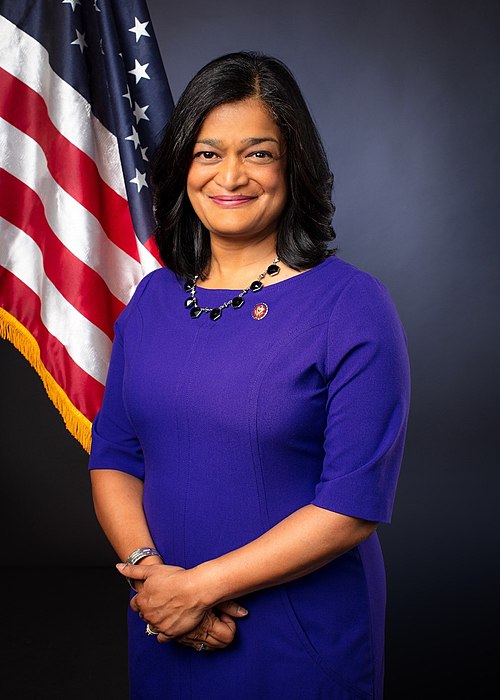Pramila Jayapal, a member of the United States house of representatives, has condemned President Donald Trump’s threat to unleash the American military “guns-a-blazing” in Nigeria. The US lawmaker labelled the approach as reckless bullying that undermines a critical regional partner that violates international norms.
The condemnation came during a congressional hearing on Thursday, 20th November, 2025, where Nigeria’s complex violence catalyst was examined. This challenged the rhetoric, and policy suggestions emanating from Trump’s Social Truth platform.
The exchange was triggered by Trump’s recent reaction to a Fox News segment, after which he re-designated Nigeria a “country of particular concern” while threatening to go into guns-a-blazing to completely wipe out the Islamic terrorists who are committing the horrible atrocities in Nigeria.
“I want to start by saying I’m very concerned that a day after President Trump saw a clip on Fox News about the persecution of Christians in Nigeria, he threatened to go “guns-a-blazing” in Nigeria, and revoke all assistance.”
“Can you tell me under what authority would the US military strike inside of Nigeria,” Jayapal stated, questioning the legality, and wisdom of such a threat.
Jayapal argued that Trump’s framing of the situation as a simple case of Christian genocide is a dangerous oversimplification. She presented a more nuanced view of the security crisis, explaining that the violence is multifaceted.
“Instead, violence has been directed against both Christians and Muslims, regardless of religion, at the hands of armed terror groups like Boko Haram and ISIS West Africa, or fuelled by differences in lifestyle between farmer and herder groups compounded by climate change and governance issues,” she detailed.
Citing a review by the non-profit Search for Common Ground, Jayapal noted that in Nigeria’s volatile Middle Belt region, religion is often not the primary driver of conflict. She described the country’s “intersectional diversity” and insisted that an effective U.S. strategy must account for these complex, interconnected factors rather than relying on a single narrative.
State Department Outlines Diplomatic “Playbook”
The contrast in approaches became stark when Jayapal turned to Jonathan Pratt, a senior official from the State Department’s Bureau of African Affairs, who was testifying at the hearing. Pratt outlined a methodical, diplomatic strategy that stood in direct opposition to Trump’s bombastic threat.
Pratt explained that Secretary of State Marco Rubio had directed the department to work with the Nigerian government on a “comprehensive plan that uses all tools at our disposal.” He emphasized that this strategy would be “primarily focused on the security that we are providing to the government of Nigeria and how they are deploying their assets.”
This cooperation, he elaborated, includes sharing intelligence, discussing counterterrorism tactics, and providing security assistance—a collaborative framework built on partnership with the sovereign Nigerian government.
Jayapal praised this measured approach, calling it “much more appropriate.” She expressed her frustration that the official, deliberative “playbook” was being overshadowed by inflammatory threats.
“I just wish we would actually stick to that playbook rather than bully and threaten a country that is extremely important to us and to the region,” Jayapal asserted, emphasizing Nigeria’s strategic significance. “I don’t think that’s the right way to go, to just go on Truth Social and threaten ‘guns-a-blazing’.”
Concerns Over Legality and Recklessness
The concerns were not isolated to Jayapal. Another committee member, Representative Sara Jacobs, echoed the alarm, explicitly characterizing Trump’s threat as “reckless.” She pointed to a significant legal and constitutional hurdle, noting that the U.S. Congress has not authorized the use of military force in Nigeria.
Jacobs firmly stated that any unilateral military action without the explicit consent of the Nigerian government would constitute a clear violation of international law, highlighting the profound diplomatic and legal repercussions of such a move.
The hearing ultimately served as a platform to underscore a deep division in proposed American foreign policy. On one side lied a threatened approach of unilateral military action, decried as simplistic and illegal. On the other is a State Department-led strategy of sustained diplomacy and capacity-building with a key African nation.
As the political landscape evolved, the tension between these two visions for engaging with Nigeria, and its complex security challenges is likely to intensify, with significant implications for both regional stability, and the future of the US–Africa relations.

